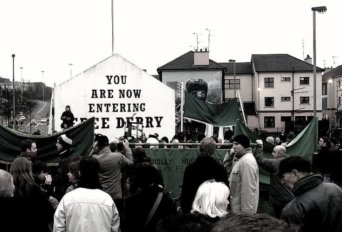- About
- Topics
- Picks
- Audio
- Story
- In-Depth
- Opinion
- News
- Donate
- Signup for our newsletterOur Editors' Best Picks.Send
Read, Debate: Engage.
| located: | Ireland, United Kingdom, India, Kenya, USA |
|---|---|
| editor: | Gurmeet Singh |
Instantly infamous, the "Bloody Sunday" killings by British soldiers of Northern Irish protestors changed British politics forever. They provided a framework of motivation and justification for the IRA and anti-British politicians in the 70s and 80s. They were considered as a part of a long line of British colonial atrocity, which includes the Amritsar Massacre and the cover-ups in Kenya.
With the enquiry that followed, protecting British soldiers, Bloody Sunday deeply affected the public's trust in the British government. So much so, that in 1998, during the Good Friday talks, Tony Blair ordered a renewal of the public inquiry into the killings – a process that is only now bearing fruit.
In 1972, Northern Irish protesters were marching against internment. 28 of them were shot by British forces, resulting in the death of 14 people. The inquiry which followed, the 'Widgery Tribunal', was described as a whitewash. The later inquiry, named after Lord Saville, the 'Saville Inquiry', concluded in 2010 that the killings were unjustified and unjustifiable. Now, a soldier called only 'Soldier F', faces charges of murder. It has taken 47 years, but some justice is finally possible.
Why has it taken so long? Speaking to NPR, former BBC correspondent Denis Murray said, "It took so long because the inquiry itself took so long [...] it interviewed thousands of people. And it lasted from 1998 to 2010. It is the longest and most costly public inquiry in British legal history. The police had to reinterview more than 650 witnesses. It had to reinterview 18 soldiers and two members of the official IRA who also fired shots that day. And they presented their file to the director of public prosecutions as long ago as 2016, and that file was 20,000 pages. And the overall file that the prosecuting authorities have is 125,000 pages."
And yet, the families of victims may choose not to continue with the prosecutions of Soldier F, they may feel that the public inquiry, and public acknowledgement of atrocity is enough.
The long history of British intervention, invasion, oppression and suppression on the island of Ireland has often been overlooked, but it is part of the colonial story; from Cromwell to the creation of Northern Ireland, British involvement in Ireland seems to mirror involvement in India, parts of Africa and the Americas, territorial expansion, oppression and institutional and cultural justifications.
It may be a stretch to mix in Brexit directly with this discussion, but the approach to Brexit, and the lack of concern for the consequences for the island of Ireland seem to be at least a continuation of a long colonial history. Brexit's primary obstacle in political circles has been the creation of a hard border between ROI and Northern Ireland – either there will be a hard border, which will suit the newly-separated trading areas but result in political unrest and a reopening of violence, or there will be no hard border, which will mean no violence, but will mean the U.K. will in-effect remain a part of the EU trading area.
It might be a stretch to put Brexit in this history, but of course, there is a nice irony to the fact that Britain is now having to face a past it has long tried to ignore.
Whatever happens to Soldier F, it must be satisfying for the families of victims to see that charges have been brought against him. To be able to get over the past, all sides must first acknowledge the past.
Photo: Derry, Ireland Bloody Sunday 35th year's commemoration. kitestramuort , CC

